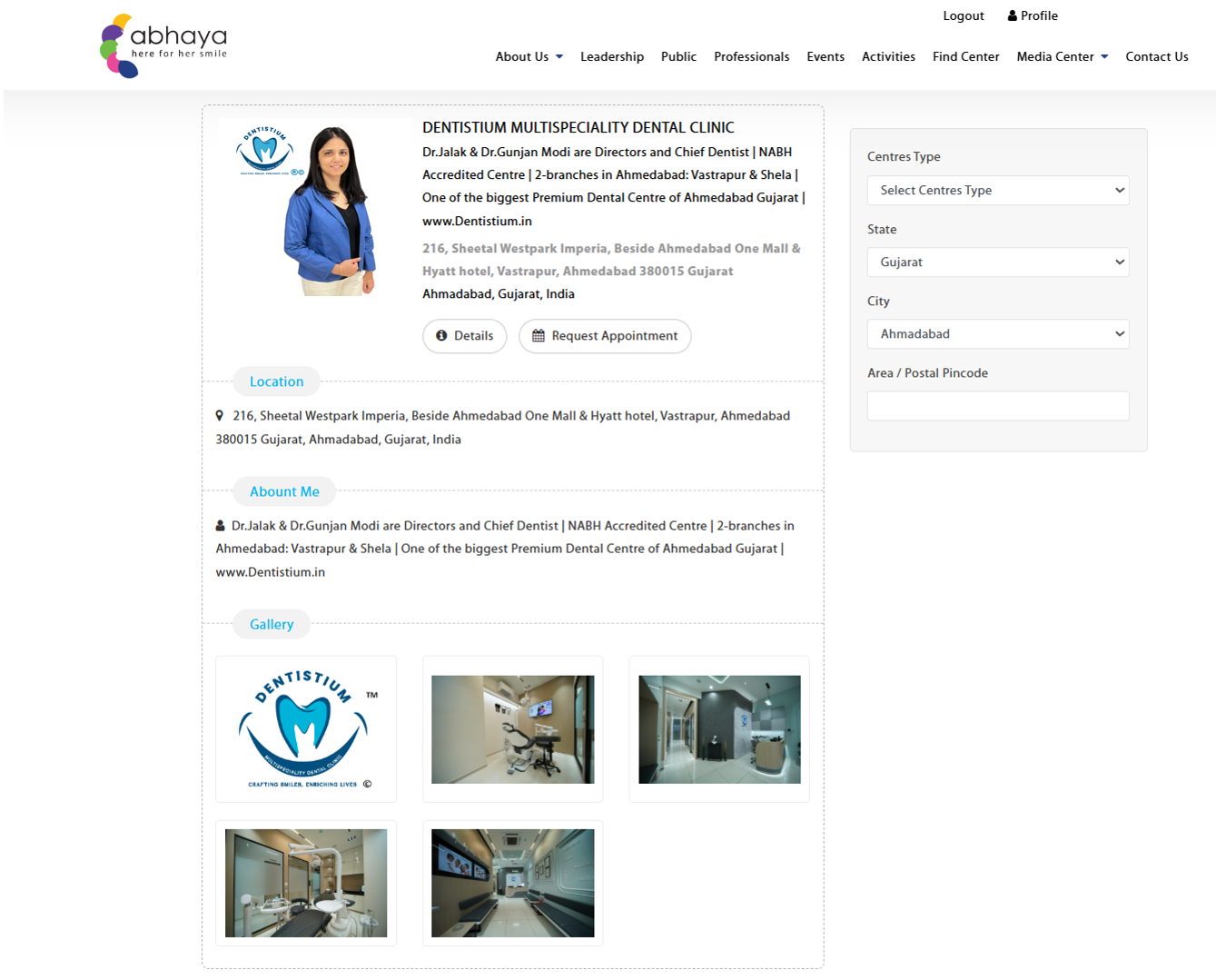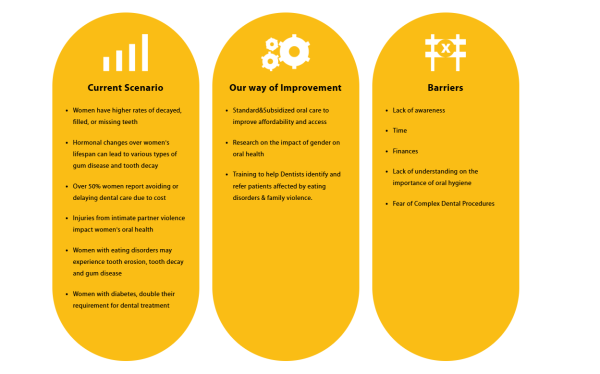Abhaya Centre (IDA recognized) is now in Ahmedabad: DENTISTIUM CLINICS
Prevention is Better Than Cure: The Role of Abhaya Centres
Since prevention is always better than cure, the Abhaya Centres place strong emphasis on preventing oral diseases among women. Promoting awareness across all age groups is the first step toward improving women’s oral health and overall well-being.
The Abhaya Initiative, launched by the Indian Dental Association (IDA) in collaboration with Group Pharma, aims to prevent and control oral diseases by empowering women through knowledge, awareness, and access to quality dental care. By building networks and providing practical tools, Abhaya encourages women to adopt healthy oral habits and make informed choices about their health.
Through these centres, various oral health awareness programs are conducted across rural, remote, and underserved areas, focusing on women whose oral health is often neglected. Every dental professional plays a vital role in reducing fear, hesitation, and misconceptions that many women experience during different stages of life.

Women’s Oral Health Through Every Stage of Life
Every woman deserves proper dental care, regardless of her age or life stage. However, hormonal changes throughout life can significantly affect oral health needs:
Puberty brings a surge in hormone levels that may cause swollen, sensitive gums and mouth sores.
Oral contraceptives, containing estrogen and progesterone, can increase the risk of gingivitis and make women more prone to developing dry sockets.
During pregnancy, women become more receptive to oral health education and treatment. For many women, especially those from low-income backgrounds, this might be their only opportunity to receive dental care.
Proper oral hygiene during pregnancy not only improves the mother’s health but also positively impacts her baby’s oral development. Integrating periodontal care with obstetric management can lead to better pregnancy outcomes and enhanced overall well-being.

1. Oral Health During Puberty
Puberty is a critical stage marked by increased levels of estrogen and progesterone. These hormonal changes can alter the mouth’s bacterial balance, leading to plaque buildup, gingivitis, cavities, and bad breath. It’s also common to notice light gum bleeding while brushing or flossing.
Common Oral Changes
Swollen, red, and bleeding gums before menstruation (known as puberty gingivitis).
Mouth ulcers and recurrent herpes infections.
Swelling of salivary glands, especially the parotid glands.
Prolonged bleeding after dental procedures.
Eating Disorders
During adolescence, body image concerns may lead to eating disorders such as bulimia or anorexia nervosa. These cause nutritional deficiencies and enamel erosion due to frequent vomiting, which exposes teeth to stomach acids and leads to tooth sensitivity and pain.
Oral Care Tips
Brush and floss daily.
For those with braces, clean around wires and brackets carefully.
Schedule regular professional cleanings to remove plaque.
Maintain a balanced diet and limit sugary and acidic foods.

2. Oral Health During Menstruation
Hormonal fluctuations during menstruation, especially the rise in progesterone, can cause temporary gum inflammation and changes in saliva flow.
Common Oral Changes
Menstrual gingivitis — red, tender, and bleeding gums.
Swollen salivary glands.
Canker sores or cold sores that appear before periods.
Mild dry mouth and bad breath.
Oral Care Tips
Continue brushing and flossing regularly.
Visit your dentist if you experience soreness or sensitivity.
The week after your period is ideal for a professional dental cleaning or minor treatments like fillings or extractions.

3. Oral Health While on Birth Control
Women using oral contraceptives, especially those containing progesterone, may notice changes in gum health. Increased hormonal levels can cause the gums to react more strongly to plaque and bacteria.
Common Oral Changes
Swollen, red, and bleeding gums (hormonal gingivitis).
Dry mouth and risk of dry socket after extraction.
Early months of pill use may show the most noticeable gum changes.
TMJ and Hormonal Link
Synthetic estrogens in birth control pills may reduce natural estrogen, possibly contributing to temporomandibular joint (TMJ) disorders — causing jaw pain, stiffness, and inflammation.
Oral Care Tips
Inform your dentist if you use birth control pills.
Certain antibiotics (penicillin, tetracycline, metronidazole) may reduce pill effectiveness.
Maintain regular dental visits to monitor gum health.

4. Oral Health During Pregnancy
Pregnancy brings significant hormonal and immune changes, increasing the risk of gum inflammation and oral infections. Maintaining oral health during this time is crucial for both mother and baby.
Why It Matters
Maternal oral infections, particularly gum disease, have been linked to preterm and low birth weight (PLBW) babies. Periodontal care during pregnancy can lead to better outcomes and overall maternal health.
Common Oral Changes
Pregnancy gingivitis affects up to 75% of women — red, swollen, and bleeding gums.
Pregnancy tumors (pyogenic granulomas) — painless gum lumps that usually resolve after delivery.
Cavities and cravings for sweet foods increase caries risk.
Acid erosion due to vomiting or acid reflux.
Dry mouth or excess saliva (ptyalism) due to hormonal changes.
Oral Care Tips
Visit your dentist regularly, especially during the second trimester (safest period).
Manage gingivitis with brushing, flossing, and professional cleaning.
Rinse your mouth after vomiting — avoid brushing immediately.
Eat nutritious foods rich in calcium, protein, and vitamins A, C, D.
Avoid tobacco, alcohol, and excessive sugar.
Inform your dentist before any dental X-rays or procedures.

5. Oral Health During Menopause
Menopause, usually around age 50, causes a decline in estrogen, affecting the mouth, bones, and saliva flow.
Common Oral Changes
Burning Mouth Syndrome (BMS) — burning or tingling of the tongue or lips.
Altered taste — metallic, salty, or bitter sensation.
Menopausal gingivostomatitis — shiny, inflamed, easily bleeding gums.
Dry mouth (xerostomia) leading to tooth decay and gum disease.
Bone loss (osteoporosis) weakening the jawbone and increasing tooth loss.
Oral Care Tips
Stay hydrated and use sugar-free lozenges or gum to stimulate saliva.
Use fluoride toothpaste and mouthwash to strengthen enamel.
Avoid spicy, salty, or sugary foods, and limit caffeine, alcohol, and tobacco.
Consider Hormone Replacement Therapy (HRT) under medical advice to reduce symptoms and prevent bone loss.
Eat foods rich in calcium and vitamin D for bone and dental strength.
Visit your dentist regularly to monitor oral and bone health.

Creating a Safe Space for Women’s Oral Health
At Abhaya Centres, we strive to create a welcoming and supportive environment where women can discuss oral health concerns openly, receive expert dental care, and gain confidence in maintaining lifelong oral hygiene.
By addressing gender-specific oral issues with compassion and professionalism, Abhaya Centres help reduce oral health inequalities and improve women’s quality of life.
A healthy woman contributes to a healthier family, community, and nation.
Educating and Empowering Women
Abhaya Centres offer a unique opportunity to educate women about oral hygiene, preventive care, and regular dental check-ups. These educational efforts extend through all life stages — from adolescence to motherhood and beyond — ensuring oral health awareness becomes a lifelong habit.
Turn Your Dental Clinic into an Abhaya Centre
Every dental professional can play a major role in this movement.
Here’s why your clinic can become an effective Abhaya Centre for Oral Health Intervention:
You already possess deep knowledge of oral structures and patient care.
Routine examinations can detect early oral changes.
Use waiting or treatment areas for short awareness videos or posters.
Frequent patient visits create opportunities for motivation and preventive education.
By transforming your clinic into an Abhaya Centre, you don’t just treat patients — you create change. You help women achieve better oral health, confidence, and long-term wellness.
Together, Let’s Build a Healthier Future
Abhaya Centres represent care, compassion, and commitment to women’s oral health.
By prioritizing prevention, awareness, and accessibility, we can ensure that every woman — no matter her background — enjoys a healthy, confident smile for life.
Abhaya Centre – For Her Health. For Her Confidence. For Her Smile.

